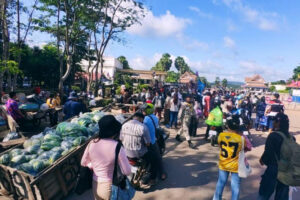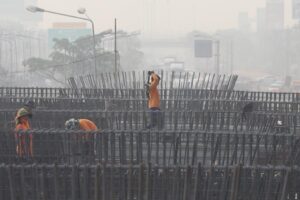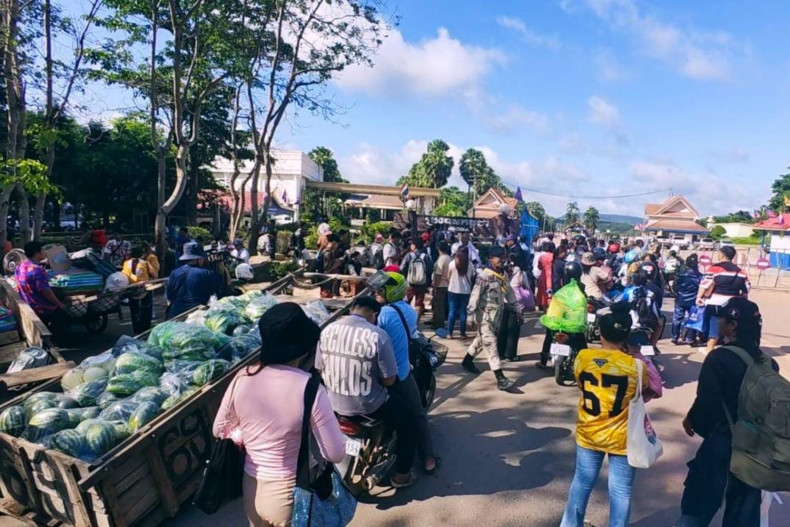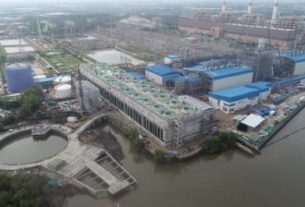
Thailand and Cambodia Border spat – Adding to the uncertainty
Effects on Construction on Property
While the economic impact of the tension with Cambodia has been minimal, it could ratchet up when tempers flare
The ongoing disputes between Thailand and Cambodia have had a minimal effect on Thai businesses, but their uncertain nature has created a sense of unease among businesses and individuals.
Some Thai enterprises said they will continue investing in Cambodia, which they view as a second home where they can adapt to changing conditions.
However, they plan to monitor the situation, and if tensions continue without constructive resolutions, they said they may rethink their business strategies.
ECONOMIC THREAT
Sompop Manarungsan, president of Panyapiwat Institute of Management, expressed concerns about the effects of border disputes on the Thai economy.
“The border issue could intensify and affect the economy,” he said.

“Thailand’s exposure to international trade is huge as several Thai products are manufactured for export. Given the pressure of global geopolitical conflicts, hindrances to border trade could affect the economy.”
According to Mr Sompop, Thailand has a trade surplus with Cambodia, Laos, Myanmar and Vietnam.
Roughly 1 million Cambodian workers are employed in Thailand, comprising both registered and unregistered workers. If those workers decide to return home, as urged by former Cambodian premier Hun Sen, they can be replaced by labourers from Myanmar, Laos and Vietnam, he said.
Yunyong Thaicharoen, chief economist and sustainability officer at Siam Commercial Bank’s Economic Intelligence Unit, said the ongoing tensions will affect border trade and tourism.
“The scale of the impacts depend on how long the border conflicts linger, but it is unlikely to be significant,” he said.
“In addition to border trade and movement of people between the two countries, sentiment among tourists from other countries could be affected if the situation escalates or lasts a while.”
Asia Plus Securities (ASPS) said the border dispute remains unclear after the Thai-Cambodia Joint Boundary Commission (JBC) meeting last week to discuss the 800-kilometre border and ease tension.
Thailand is scheduled to host the next JBC meeting in September 2025, and Cambodia has requested the International Court of Justice rule on four disputed border areas.
“This conflict may continue and could escalate at any time, adversely affecting Thailand’s GDP,” said the brokerage.
The healthcare sector faces a minimal risk, as most Cambodian patients in Thai hospitals fly in and have high purchasing power, said ASPS.
However, the Cambodian patient base has declined for several quarters, so the dispute should not affect the revenue of Thai hospitals significantly and can be offset by patients from other countries, noted the brokerage.
Hospitals near the border may have fewer patients, such as a Bangkok Chain Hospital in Aranyaprathet district of Sa Kaeo province. Bangkok Dusit Medical Services (BDMS) has two hospitals in Cambodia focused on expats, though they comprise only 1% of BDMS’s revenue.
MINIMAL PROPERTY IMPACT
Calls for Cambodian workers to return home are expected to have minimal impact on Thailand’s residential property sector, as most construction workers in this segment are from Myanmar and the market is cooling.
Issara Boonyoung, chairman of the real estate development committee at the Thai Chamber of Commerce, said 80-90% of the foreign labour force at housing construction sites is comprised of Myanmar nationals, with the remainder from Laos and Cambodia.
“Cambodian workers are more prevalent in infrastructure projects, which require large workforces. In contrast, residential construction typically involves fewer workers and mostly skilled labourers, who are predominantly Thai,” he said.
Mr Issara said the effect may be more noticeable in the eastern region, closer to the Cambodian border.
Developers in that area may need to prepare contingency plans if a large-scale exodus occurs, he said.
“The question is whether these calls for Cambodian workers to return are mandatory or politically driven,” said Mr Issara. “If this is regarding expired passports not being renewed, the existing supply of foreign workers, particularly those from Myanmar, should still be sufficient to meet construction demands.”
The return of Cambodian workers back home is unlikely to disrupt the residential sector, which is in a slowdown, he said.
“With fewer projects underway, the current workforce can meet demand,” said Mr Issara.
Songkran Issara, chief executive of SET-listed Charn Issara Development, echoed this sentiment, stating the company’s housing projects, which are primarily low-rise residences in the upper-end segment, rely heavily on skilled Thai workers.
“At our residential construction sites, 90% of the workforce is Thai because we need skilled labour. Only around 10% are foreign workers, and Cambodians make up a very small fraction,” he said.
Sutee Ketsiri, managing director of homebuilder Built to Build Group, said many Cambodian workers in Bangkok are reluctant to return home, preferring to stay in Thailand where wages and employment opportunities are greater.
“Residential construction has slowed significantly, as contractors that used to work with major developers are now seeking jobs with us,” he said. “Even large players in the housing market are turning to homebuilding contracts.”
Mr Sutee said he thinks the calls for Cambodian workers to return home will be short-lived.
“This is unlikely to drag on for months like in the past, when tensions between Thailand and Cambodia would occasionally flare up but quickly subside,” he said.
According to ASPS, the construction sector comprises the largest share of Cambodian workers in Thailand. There are 16,000 Cambodian construction workers in Thailand, mostly semi-skilled or low-skilled workers.

Major contractors in Thailand such as Ch. Karnchang and Stecon Group mostly hire workers through subcontractors, including Cambodian workers.
“If there are no Cambodian construction workers, construction projects across Thailand — both government and private — will be affected,” said ASPS.
ALTERNATIVE LINKS
Thailand’s major telecom operators are expected to suffer a small loss from Cambodia’s disconnection of their network links following the border dispute, said a telecom operator source who requested anonymity.
The source estimated the major telecom operators earned only a few million baht in monthly revenue from providing service to Thai customers based in Cambodia before the disconnection.
The Thai operators have international private leased circuit (IPLC) links with their Cambodian counterparts.
Cambodian telecom operators recently disconnected some of these links, disrupting Thai operators’ services in that nation.
The disconnection also affected customers of Thai telecom operators in other countries that use services via the IPLC links with Cambodia.
“Earlier we thought this situation would not last longer than a month, but now we think it’s likely to be longer,” the source added.
The source said executives at his telecom company expect to enter into negotiations with telecom operators in other neighbouring countries, especially Laos, to establish IPLC links with Thailand.
This would enable the company to avoid using the IPLC links with Cambodia to provide telecom service to regional countries, said the source.
The Thai company plans to talk with a Laos telecom operator regarding an IPLC link, which could take 15-30 days to establish, added the source.
According to a recent report from Khmer Times, Cambodian Prime Minister Hun Manet said the country ceased purchasing internet bandwidth from Thailand, following reports of threats made by extremist groups in Thailand calling for the halt of electricity and internet services to Cambodia.
On June 13, state enterprise National Telecom (NT) disclosed that two routes of its cable network running from Thailand to Cambodia were disconnected, affecting broadband internet service to its Thai corporate customers in Cambodia.
According to NT president Col Sanphachai Huvanandana, reports of spotty broadband service in Cambodia on the morning of June 13 prompted technicians to investigate. They found the cable networks running from Aranyaprathet and Koh Kut to Cambodia were disconnected.
The disruption of the broadband internet signal on both routes affected NT’s Thai customers in Cambodia, he said, though it is too early to evaluate the damage.
According to the National Broadcasting and Telecommunications Commission, there are 14 licensed Thai companies with overseas network connectivity points located at the Thai-Cambodian border, including NT, Advanced Wireless Network, True Move H Universal Communication, True Internet Corporation and Electricity Generating Authority of Thailand.
RISK FOR THAI PRODUCTS
“I am not sure about the direction of this situation,” said Pun Paniangvait, general manager of Thai President Foods, a manufacturer of Mama instant noodles.
He said if any border restrictions are introduced that prevent product exports from Thailand, it will impact all companies that export to Cambodia, not only Mama.
The company exports Thai-produced Mama products to Cambodia and manufactures them at its facility in Phnom Penh serve the local market.
In May, Mr Pun said he noticed increased exports to Cambodia, which could be a sign of stockpiling.
Sales to the Cambodian market account for 6% of the company’s total sales.
Thai President Foods is relocating its factory in Phnom Penh to a new location to expand production. The plan remains on track, with operations at the new site expected to commence next year, he said.
Mr Pun said he noticed a trend in Cambodia of promoting the consumption of locally made products.
He said this shift is possible, but changes to consumer behaviour take time.
BORDER TRADE SUFFERS
Prolonged tensions between Thailand and Cambodia will have a significant impact on business confidence in both countries, according to the Thai Chamber of Commerce.
Jiraphant Asvatanakul, vice-chairman of the chamber, said the situation is already affecting independent Thai and Cambodian vendors at border markets.
With border checkpoints operating on shorter hours, entrepreneurs are under pressure to carefully plan their sales operations. This means they must stockpile products in advance and arrange logistics to transport goods before the checkpoints close, he said.
These actions can increase costs and make it inconvenient for daily cross-border labourers, who are concerned about their livelihoods, noted the chamber.
In the medium term, these challenges are likely to diminish the confidence of businesses on both sides of the border. The Thai chambers in border provinces are adapting to these changes, said Mr Jiraphant.
For the longer term, he said the conflict may disrupt collaboration between the Thai and Cambodian chambers regarding plans to lift trade volumes by exporting Thai goods through Phnom Penh to Ho Chi Minh City in Vietnam. From there, Thai products would be shipped to Japan, South Korea and southern China.
This route is considered more efficient than shipping from Laem Chabang Port in terms of transit time, but could be disrupted if the conflict continues, said Mr Jiraphant.
The chamber is monitoring the situation and remains hopeful for a peaceful resolution through negotiation in the near future, he said.
According to the Department of Foreign Trade, border trade with Cambodia tallied 15.3 billion baht in April, up 16.5% year-on-year. Thai exports rose 11.1% to 12.1 billion baht, while imports expanded 43.1% to 3.21 billion.
Key exports included beverages, minerals, fuels, and flavoured mineral water, while major imports consisted of vegetables, vegetable-based products, aluminium scraps, and insulated cables.
From January to April, border trade increased by 12.4% year-on-year to 67.1 billion baht.
Visit Limlurcha, president of the Thai Future Food Trade Association, said if the dispute continues unresolved, it will lead to significant disruptions in the flow of goods between the two countries.
Agricultural products, processed foods, construction materials, and consumer goods exported from Thailand to Cambodia will face delays at border checkpoints, he said, potentially resulting in lost revenue or increased costs as producers seek alternative transport routes.
Border trade is expected to slow, and if access to checkpoints is restricted, trade at border areas could be halted, hurting local residents and businesses, said Mr Visit.
Tourism revenue in provinces such as Sa Kaeo, Si Sa Ket and Buriram may take a hit if connections between the two countries cannot be maintained and the movement of people and labour across borders is halted, he said.
However, if the conflict is short-lived and manageable, the impact may be limited to logistics issues and a temporary dip in investment confidence, said Mr Visit.
“If tensions persist without constructive negotiations or solutions, Thai investment interest in Cambodia may decline, prompting operators to explore more stable options elsewhere in the region,” he said.
TOURISM EFFECT
“I hope the situation won’t escalate,” said Thai chef and restaurateur Thitid Tassanakajohn, also known as Chef Ton.
He said the media coverage often makes situations seem more severe than they actually are.
If the phrase “Thailand at war” spreads without an actual conflict, it could seriously damage the country’s image, said Mr Thitid. Travellers hearing that news may feel anxious and choose to postpone their trips, he said.
“I hope the situation can be resolved soon,” said Mr Thitid.
Big C Supercenter Plc, which has operations in Cambodia, declined to comment on the dispute, while SET-listed Major Cineplex Group, which operates cinemas in the neighbouring nation, did not respond to requests for comment.
Source: https://www.bangkokpost.com/business/general/3055722/adding-to-the-uncertainty

